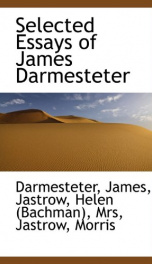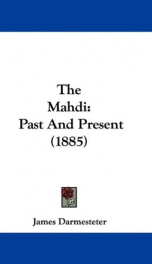selected essays of james darmesteter

Purchase of this book includes free trial access to www.million-books.com where you can read more than a million books for free. This is an OCR edition with typos. Excerpt from book: AFGHAN LIFE IN AFGHAN SONGS. On the night of the 7th of April, 1886 (Wednesday, eleven p. M.), as I was sitting in the garden of my bungalow at Peshawer, gazing at the stars and the silver moon, I heard my Afghan chaukidar,1 old Piro, of the Khalil tribe, muttering in a broken voice, fragments of a song that sounded like a love-song. I asked him to repeat the song to me; this he modestly declined to do for a long time, but at last he gave way, and began: " My love is gone to Dekhan, and has left me alone : I have gone to him to entreat him. ' What is it to me that thou shouldst become a Raja at Azrabad ?'2 I seized him by the skirt of his garment and said : ' Look at me !' " Here old Piro stopped, and neither for love nor for money could I prevail upon him to go on; his repertoire was exhausted. But my interest had been awakened, and from that night I resolved to collect what I could of the Afghanpopular poetry; the field was new and unexplored : English people in India care little for Indian songs. 1 As life and property are not very safe at Peshawer, it is usual to keep an armed watchman, called chaukidar. 2 Hyderabad, a favorite place of resort for Afghan adventurers and soldats de fortune. I had gone to the border to study the Afghan language and literature, but I had soon to recognize that the so-called Afghan literature is hardly worth the trouble of a journey from Paris to Peshawer. It consists mainly of imitations and translations from the Persian, Arabic, and Hindustani. For a time, under the Moguls, an original and free spirit permeated those imitations, and Mirza Ansari, the mystical poet, or Khushhal Khan, prince of the Khatak tribe, would be accounted a true poet in any nation and any literature. But these are rare exceptions, and the t...
Info about the book
Author:
Series:
Unknown
ISBN:
0548121818
Rating:
3.5/5 (1)Your rating:
0/5
Languge:
English
Users who have this book
Users who want this book
What readers are saying
What do you think? Write your own comment on this book!
write a commentif you like selected essays of james darmesteter try:
Do you want to exchange books? It’s EASY!
Get registered and find other users who want to give their favourite books to good hands!



